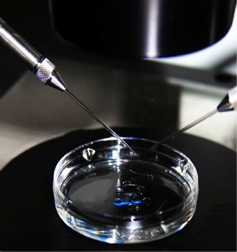ICSI treatment is considered to be safe and effective. The main risks of ICSI are;
 1. Egg damage. On inserting the sperm into the egg using there is small risk of damaging the egg. An average of 92% of all injected eggs survive the procedure.
1. Egg damage. On inserting the sperm into the egg using there is small risk of damaging the egg. An average of 92% of all injected eggs survive the procedure.
2. Fetal abnormalities. Children born after ICSI treatment have been closely followed up in many countries and the data so far has been reassuring that there are no significant increases in birth defects or other common problems. One or two countries have noticed a slightly higher rate of some rare genetic and developmental defects in a very small number of children born after ICSI.
However, these problems may actually have been caused by the underlying infertility problems, rather than the ICSI treatment. At the moment we do not studies are collecting more information.
3. Boy children may inherit a genetic infertility problem. It is possible a boy baby conceived as a result of ICSI may inherit his father’s infertility (if it had a genetic cause).
It is too early to know if this is the case, as the oldest boys born from ICSI are still in their early teens. However if the father’s infertility problem had a genetic cause then this is likely to be passed on to any boy children born with ICSI. For this reason couples should consider undergoing genetic tests before going ahead with ICSI, to see if the male carries any genetic causes for infertility that can be detected at the present time.